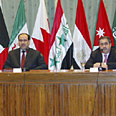
Dawn of a new era?
Baghdad conference may lead to political turning point in region
The participation of the United States, Iran and Syria in the international conference in Iraq over the weekend, aimed at ending the violence there, created the potential for a political turning point. Realization of this potential would be subject to Teheran's and Damascus' actions in the coming months both in Iraq and in other conflict areas in the region, and on the pressure the US Administration and Congress would exert in an attempt to launch direct and comprehensive talks with the two countries.
In American diplomacy there exists a clear distinction between various meeting frameworks and negotiations with hostile countries, among them Iran and North Korea. The Bush Administration did not reject meetings and negotiations with these countries within an international framework, and representatives from Washington and Teheran have already participated in a conference held by the United Nations in Bonn in 2001 where Afghanistan was on the agenda. On the other hand, Bush set a precondition for direct negotiations with Iran: Cessation of uranium enrichment. Iran has rejected this condition thus far.
The conference in Baghdad over the weekend met the American conditions for talks with hostile countries. The Iraqi government initiated the conference, in which 13 states and three international organizations took part. The conference was described as aiming to elicit regional and international assistance in ending the violence in Iraq - this initial round of talks was conducted by relatively low ranking officials.
The US could not have boycotted such a conference. The Iraqi prime minister called for barring the passage of terrorists through its borders, and for putting an end to their training, arming and funding. It was clear which countries he was referring to. The US representative repeated the same things, and the main question is what will Iran and Syria do.
In the long run there is a fundamental contradiction between the interests of the US and Iran in Iraq and the Middle East. The US is seeking to stabilize a pro-Western regime in Iraq that would serve as a functioning democratic model for the entire region, while Iran wants to take over Iraq and establish an Islamic Shiite regime there. The US would like to see a secular democratic government in Iran that would replace the Ayatollah regime and an Iran free of nuclear arms. The incumbent regime in Iran wants to assure its survival, purchase nuclear arms, and head an Islamic struggle against the US, the West and existing regimes in the region.
Common interest
On the other hand, in the immediate range the US and Iran share a common interest in Iraq: Reducing violence and stabilizing the regime. The US wants to end the transfer of Iranian arms to radical Shiite groups attacking US troops and Iraqi Sunni civilians. Iran is interested in restraining the murderous Sunni terror attacks on the Shiites and the US' swift departure from Iraq. It is also interested in the release of Iranians arrested by the US in Iraq. Both parties believe that stabilization of the regime in Iraq would in fact assure their long-term objectives.
According to the US, this is a test of Iran and Syria's conduct. Cooperation in Iran that would lead to a substantial drop in terror is likely to lead to a prominent turning point in Bush's policies, including direct negotiations and concessions on issues such as Iran's nuclear ambitions, Syria's status in Lebanon and negotiations between Israel, Syria and the Palestinians.
If the framework of the conference in Iraq actually works, Israel would demand to partake in a similar conference that would focus on the Arab-Israeli conflict, and if the US would see the benefit of negotiations with Iran and Syria, Israel would have to conduct talks with Syria, Hamas and Hizbullah.
Professor Gilboa is a lecturer of political science and communications at the Bar Ilan University










